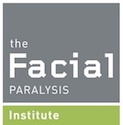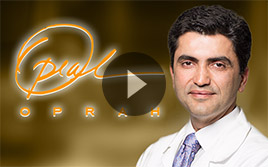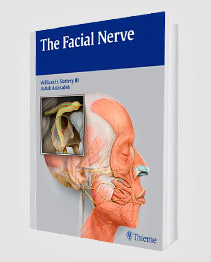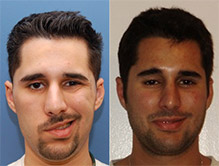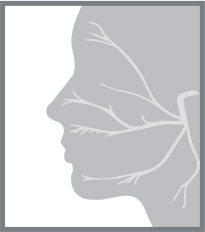Dr. Azizzadeh understands the importance of bringing his patients the most cutting edge and revolutionary treatments possible for all types of facial paralysis conditions, including the extremely rare Ramsay Hunt Syndrome, a condition that can bring severe facial paralysis to individuals as a result of the reactivation of the chicken pox virus. At the Facial Paralysis Institute in Beverly Hills, Dr. Azizzadeh utilizes the same comprehensive approach in treating the condition with both non-invasive and surgical procedures.
What Is Ramsay Hunt Syndrome?
Ramsay Hunt Syndrome is a condition in which shingles compromises the facial nerve, often time resulting in symptoms including hearing loss on the affected side of the face and even temporary facial paralysis as well as a blister like rash near the ear. Ramsay Hunt is caused by the varicella zoster virus, the same virus that brings chicken pox to children, and it is believed that once an individual is healed from the chicken pox, the virus can lay dormant for years and surface again as Ramsay Hunt Syndrome later in life. To combat the virus itself, a patient is usually given very high doses of antiviral medications.
If you believe that you may be suffering from the condition, seeking proper medical attention in a timely manner to lower your risk of complications is of the utmost importance as the facial paralysis induced by Ramsay Hunt Syndrome can be much more severe than in instances of other conditions.
Common Ramsay Hunt Syndrome Symptoms
Ramsay Hunt syndrome patients commonly experience a red rash in and around one ear, as well as facial paralysis and weakness on the same side as the affected ear. Generally, the aforementioned ear rash and facial paralysis or weakness start at the same time. In some instances, however, an individual may experience an ear rash before facial paralysis or weakness, or vice-versa. Or, in certain cases, a Ramsay Hunt syndrome patient experiences facial paralysis or weakness without an ear rash.
Additionally, various other symptoms are associated with Ramsay Hunt syndrome, and these include:
- Ear pain
- Ringing in the ears
- Loss of hearing
- Difficulty closing one eye
- Spinning or moving sensation (vertigo)
- Loss of taste
- Dry mouth or eyes
If an individual experiences one or more of the aforementioned symptoms, it is paramount to consult with a doctor. That way, an individual can receive a proper diagnosis and determine the best steps to address his or her symptoms.
Potential Ramsay Hunt Syndrome Complications
Symptoms that go unaddressed for an extended period of time may lead to a variety of long-term medical problems, such as:
- Permanent hearing loss
- Permanent facial paralysis or weakness
- Eye damage
- Postherpetic neuralgia (caused by a shingles infection that damages nerve fibers)
For those who believe they may be dealing with Ramsay Hunt syndrome, there is no need to wait to treat this condition. Instead, a consultation with Dr. Azizzadeh allows an individual to immediately treat his or her symptoms.
Dr. Azizzadeh is a globally recognized facial plastic and reconstructive surgeon who understands all aspects of Ramsay Hunt syndrome. He takes a holistic approach to patient treatment, and by doing so, helps Ramsay Hunt syndrome patients achieve long-term symptom relief.
Facial Paralysis Caused By Ramsay Hunt Syndrome
Because facial paralysis is a common symptom of Ramsay Hunt Syndrome, world-renowned facial paralysis surgeon Babak Azizzadeh, MD, FACS, treats patients dealing with the condition who are struggling with regaining facial animation. Much like other forms of facial paralysis, the type that is associated with Ramsay Hunt Syndrome can occur very quickly and without warning, though a tell-tale sign that a person may be suffering from the condition is a painful rash near the ear.
When this is treated early, patients have the highest chance of getting full recovery. To aid in a symmetrical and balanced appearance in the meantime, Dr. Azizzadeh may utilize Botox therapy and fillers to help bring symmetry to his patient’s faces. Botox works to actually relax the paralyzed muscles in the face creating less of a pull during a smile or other facial expressions.
If you’re experiencing permanent facial paralysis as a result of Ramsay Hunt Syndrome, there are several surgical options that have brought great success to patients from around the globe, including the masseter-to-facial nerve transfer and cross-facial-nerve-transplant.
A Closer Look at Treatments for Facial Paralysis Caused by Ramsay Hunt Syndrome
Botox for facial paralysis is one of the leading treatments for facial paralysis caused by Ramsay Hunt syndrome. It relaxes unwanted facial muscle movements to correct asymmetric facial movement. Botox may also be used in combination with neuromuscular retraining to deliver long-term results.
Selective neurolysis is a revolutionary surgical procedure to treat facial paralysis and synkinesis. Pioneered by Dr. Azizzadeh, selective neurolysis is a permanent facial paralysis treatment. Selective neurolysis involves reducing the activity of facial nerves that hamper the smile mechanism. Dr. Azizzadeh uses the procedure to release the platysma muscle that pulls the corner of the mouth down. This results in spontaneous reanimation of the face, as well as a natural-looking smile.
Masseter nerve transfer is a surgical procedure that has been shown to help patients who have been experiencing paralysis for less than three years. During a masseter nerve transfer, Dr. Azizzadeh makes an incision near the front of a patient’s ear. Next, Dr. Azizzadeh identifies the facial and masseteric nerves and sews them together. The end result: a patient’s facial muscle function and smile are restored.
A cross facial nerve transplant is sometimes used to treat facial paralysis caused by Ramsay Hunt syndrome, too. With a cross facial nerve transplant, nerve grafts are harvested from a patient’s lower leg. These grafts are then attached to a patient’s facial nerve. Additionally, gracilis muscle free flap is harvested from a patient’s inner thigh, then connected to the cross-facial nerve graft and artery/vein in the neck. A cross facial nerve transplant generally helps a patient regain his or her ability to make facial movements within about eight months of treatment. A patient may also require physical therapy for roughly 18 months after the procedure.
The best treatment option for facial paralysis caused by Ramsay Hunt syndrome varies based on the patient. By consulting with Dr. Azizzadeh, a patient can receive expert insights into different treatment options.
How Does Dr. Azizzadeh Treat Facial Paralysis Caused by Ramsay Hunt Syndrome?
Dr. Azizzadeh crafts a custom treatment plan for facial paralysis caused by Ramsay Hunt syndrome. This plan is designed to deliver long-lasting results.
To craft a personalized treatment plan, Dr. Azizzadeh first meets with a patient. He learns about a patient’s facial paralysis symptoms and evaluates this individual’s medical history. Next, Dr. Azizzadeh produces a personalized treatment plan and discusses his strategy to address this individual’s facial paralysis symptoms. If a patient has any treatment plan concerns or questions, Dr. Azizzadeh responds to them. Finally, Dr. Azizzadeh and a patient work together to put this plan into action.
Dr. Azizzadeh closely monitors a patient’s progress as well. As a result, Dr. Azizzadeh ensures a patient is fully supported throughout the treatment process and helps this individual alleviate his or her facial paralysis symptoms.
Ramsay Hunt Syndrome FAQ
Because individuals who suffer from facial paralysis as a result of Ramsay Hunt Syndrome often have a great deal of questions as their condition arises seemingly out of no where, Dr. Azizzadeh has compiled a list of his most frequently asked questions to help you better understand your condition. If you have additional questions, we encourage you to contact our medical practice today.
Q:Is facial paralysis caused by Ramsay Hunt Syndrome painful?
A: Ramsay Hunt Syndrome itself can bring a very painful blister like rash to the individual suffering from the disorder, which can be painful. Facial paralysis as a result of the condition, however, is most likely not.
Q: Am I a good candidate to undergo Botox for facial paralysis?
A: If you’re experiencing an uneven smile as a result of Ramsay Hunt Syndrome, you might be a great candidate to undergo treatment. To find out, it’s important to schedule a consultation at the Facial Paralysis Institute.
Q: Are treatments to help facial paralysis caused by Ramsay Hunt Syndrome covered by insurance?
A: This depends greatly on your insurance provider. At the Facial Paralysis Institute in Beverly Hills, we make sure to work with your insurance company to the best of our ability in an attempt to get as much of your treatment covered as possible.
Q: Who should administer Botox treatments for facial paralysis?
A: It is ideal to have an experienced facial plastic surgeon give you Botox injections for your condition, as they have the most experience of both the function and aesthetics of the face.
Q: How long does facial paralysis from Ramsay Hunt Syndrome usually last?
A: This greatly depends on how soon you’re able to seek treatment for your condition. The most important part of curing Ramsay Hunt Syndrome is to make sure that you visit a physician as soon as you realize you may be suffering from the disorder, as fighting the virus is key to reduce the length of your disorder and future complications.
Contact The Facial Paralysis Institute Today
Understanding that there are options for individuals suffering from facial paralysis induced by Ramsay Hunt Syndrome is the first step in putting a smile back on your face. If you would like more information regarding treatment for facial paralysis as a result of Ramsay Hunt Syndrome, we encourage you to contact the Facial Paralysis Institute today to schedule your consultation with revolutionary surgeon Dr. Azizzadeh. At the Facial Paralysis Institute, Dr. Azizzadeh works to come up with a custom treatment plan for each and every patient, as he understands the importance of re-creating your facial balance unique to you.
Request your consultation with Dr. Azizzadeh today
Call us at (310) 657-2203 to schedule an appointment.
Schedule a Consultation